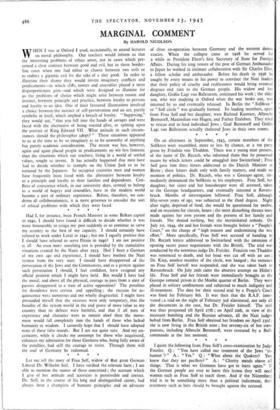MARGINAL COMMENT
By HAROLD NICOLSON
WHEN I was at Oxford i used, occasionally, to attend lectures on moral philosophy. Our teachers would inform us that the interesting problems of ethics arose, not in cases which pre- sented a clear contrast between good and evil, but in those border- line cases when one had either to choose between two evils or to endure a gigantic evil for the sake of a tiny good. In order to illustrate their theme they would invent imaginary conflicts and predicaments—in which cliffs, towers and crocodiles played a most disproportionate part--and which were designed to illumine for us the problems of choice which might arise between reason and instinct, between principle and practice, between loyalty to persons and loyalty to an idea. One of their favoured illustrations involved a choice between the instinct of self-preservation and an act, purely symbolic in itself, which implied a breach of loyalty. " Supposing," they would say, " that you fell into the hands of. savages and were faced with the alternative of being roasted alive, or spitting upon the portrait of King Edward VII. What attitude in such circum- stances should the philosopher adopt? " These situations appeared to us at the time to be so imaginary as to be unworthy of anything but purely academic consideration. The recent war has, however, again and again placed people in predicaments no wit less fantastic than the situations which our teachers, living in a world of settled values, sought to invent. It has actually happened that men have had to decide whether to trample on the Union Jack or to be tortured by the Japanese. In occupied countries men and women have frequently been faced with the alternative between loyalty to a principle and loyalty to their families and dependents. Con- flicts of conscience which, in our university days, seemed to belong to a world of bogeys and crocodiles, have in the modern world become a part of ordinary experience. Before, therefore, we con- demn all collaborationists, it is more generous to consider the sort of ethical problems with which they were faced.
• * * *


























 Previous page
Previous page